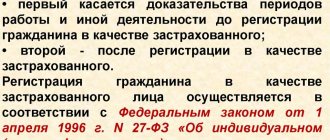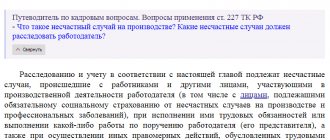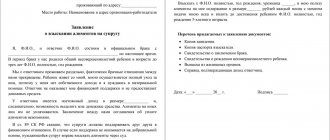Types of disciplinary sanctions
The Labor Code of the Russian Federation provides for three main types of penalties:
- comment;
- rebuke;
- dismissal.
Penalties (monetary penalties) for labor misconduct are prohibited.
This list of penalties is exhaustive; the employer does not have the right to independently introduce its own types of disciplinary punishments into the organization.
Separate sectoral acts of legislation may establish specialized penalties.
So, for example, the following may be applied to employees of the prosecutor's office: a severe reprimand, a demotion in class rank, deprivation of a badge, a warning about incomplete official compliance. A severe reprimand and warning of incomplete compliance also applies to the crew of a Russian Navy vessel, etc.
Disciplinary action
It should be noted that the legislator allows only one penalty for one violation of labor discipline. So, if an employee received reprimands several times, and then they decided to fire him for repeated failure to fulfill job duties (clause 5, part 1, article 81 of the Labor Code of the Russian Federation), such dismissal will be considered illegal.
By the way, the presence of the above article in the Labor Code of the Russian Federation should encourage the employee to initiate the cancellation of the disciplinary sanction. Otherwise, he may be fired if he commits a repeated violation.
Federation of Trade Unions of Kamchatka
Case No. <…>
R E IIIE N I E
IN THE NAME OF THE RUSSIAN FEDERATION
<�…><�…>
<…> court of the Kamchatka Territory composed of presiding judge Ts.N.V., with secretary B.Ya.V.
with the participation of the plaintiff, the plaintiff’s representative B.A.V., the representative <…>
Having considered in open court a civil case based on the claim of B.R.B. to <…> on declaring the order illegal, compensation for moral damage,
INSTALLED:
The plaintiff filed the said claim in court, citing the circumstances that he works at <…>. By order No. <…> from <…> she was reprimanded for violating Art. 21 of the Labor Code and paragraph 120 of the Instructions. She believes that the order imposing a disciplinary sanction on her is illegal, since she was not familiar with her job responsibilities <...>, as well as with the materials of the administrative investigation. She asked to recognize the order <…> as illegal and to recover compensation for moral damage in her favor in the amount of <…>.
Based on the court ruling dated <…>, at the court hearing, at the request of the plaintiff and the plaintiff’s representative, <…> and <…> were brought in as co-defendants.
The plaintiff did not appear at the court hearing, she was duly notified of the time and place of the consideration of the case, and asked the case to be considered in her absence.
Defendants <…> and <…>, a representative to the court were not properly notified of the time and place of the consideration of the case.
In accordance with Part 3 of Art. 167 of the Code of Civil Procedure of the Russian Federation, the case was considered in the absence of persons who failed to appear.
The representative of the plaintiff B.A.V., admitted to participate in the case as a representative at the written request of the plaintiff, supported the claims of her principal. She explained to the court that when imposing a disciplinary sanction in the form of a reprimand on the plaintiff, Art. 192 of the Labor Code of the Russian Federation, since disciplinary sanction is applied for non-fulfillment or improper fulfillment of labor duties assigned to employees. The plaintiff is not familiar with her work responsibilities.
<…> believed the demands were stated unreasonably. He checked the guard to check its combat readiness to repel an attack. When checking the guard, a combat crew is developed according to which the personnel should act, including it was brought to the B.R.B. in a written form. During the inspection, they were given the command “Attack the guardhouse,” after which the plaintiff was supposed to take up defense on the 2nd floor of the guardhouse, but she continued to stand in the common room. An additional agreement to the employment contract was concluded with the plaintiff, which stated that she was obliged to fulfill the requirements <…>. She was violated <…>.
Representatives <…> believed the order to impose on B.R.B. disciplinary action is legal and asked to refuse to satisfy the claims.
The court, having heard the representative of the plaintiff, the representative of <…>, having examined the materials of the case, comes to the conclusion that the plaintiff’s claims must be satisfied on the following grounds.
According to Art. 349 of the Labor Code of the Russian Federation for employees who have entered into an employment contract to work in military units, institutions, military educational organizations of higher education and military professional educational organizations, other organizations of the Armed Forces of the Russian Federation and federal executive authorities, in which the legislation of the Russian Federation provides for military service, as well as workers undergoing alternative civilian service replacing military service are subject to labor legislation and other acts containing labor law norms, with the specifics established by the Labor Code, other federal laws and other regulatory legal acts of the Russian Federation.
In accordance with Art. 192 of the Labor Code of the Russian Federation for committing a disciplinary offense, that is, failure or improper performance by an employee through his fault of the assigned labor duties, the employer has the right to apply disciplinary sanctions, including in the form of a reprimand.
By virtue of Part 1 of Art. 392 of the Labor Code of the Russian Federation, in conjunction with the provisions of Art. 352 of the Labor Code of the Russian Federation, everyone has the right to protect their labor rights and freedoms by all means not prohibited by law; an employee has the right to go to court for resolution of an individual labor dispute within three months from the day he learned or should have learned about a violation of his rights, and in disputes about dismissal - within one month from the date he was given a copy of the dismissal order or the day of issue of the work book.
Within the meaning of the explanations contained in paragraph 53 of the Resolution of the Plenum of the Supreme Court of the Russian Federation dated March 17, 2004 No. 2 “On the application by the courts of the Russian Federation of the Labor Code of the Russian Federation”, a circumstance that is important for the correct consideration of cases of challenging a disciplinary sanction or reinstatement at work and subject to proof by the employer, is his compliance when applying a disciplinary sanction to an employee arising from Articles 1, 2. 15, 17 -19, 54 and 55 of the Constitution of the Russian Federation and the general principles of legal, and therefore disciplinary liability, recognized by the Russian Federation as a rule of law state, such as justice, equality, proportionality, legality, guilt. humanism. For these purposes, the employer must provide evidence indicating not only that the employee committed a disciplinary offense, but also that when imposing a penalty, the severity of this offense and the circumstances under which it was committed were taken into account (part five of Article 192 of the Labor Code of the Russian Federation), as well as the employee’s previous behavior and attitude towards work.
In accordance with the Regulations on departmental security of the Ministry of Defense of the Russian Federation, approved by the Decree of the Government of the Russian Federation dated <…>, labor relations with departmental security employees are regulated by the labor legislation of the Russian Federation. The job responsibilities of departmental security workers for the protection of protected facilities are determined by the heads of the protected facilities and in accordance with the labor legislation of the Russian Federation and regulations of the Ministry of Defense of the Russian Federation.
According to the entries in the work book, the plaintiff <…> was hired at <…> for the position <…> (case sheet 6-7).
<…> the plaintiff was transferred by <…> to <…> in agreement with <…>.
<…> was reorganized into a branch <…>. on the basis of <…> from <…> the branch <…> was reorganized into <…> and included in the composition of <…>.
By virtue of Art. 11 Federal Law “On Defense” The Armed Forces of the Russian Federation consist of central military command and control bodies, associations, formations, military units and organizations that are included in the branches and branches of the Armed Forces of the Russian Federation and in troops that are not included in the branches and branches of the Armed Forces of the Russian Federation.
In accordance with Art. 11.1. Federal Law "OS Defense" The department of association, the department of formation and the military unit of the Armed Forces of the Russian Federation can be a legal entity in the form of a federal government institution.
The decision to create as a legal entity the directorate of a formed association, the directorate of a formed formation or a formed military unit of the Armed Forces of the Russian Federation, as well as the reorganization or liquidation of the said legal entity, is made by the Minister of Defense of the Russian Federation. In the event of reorganization (disbandment) of an association, formation or military unit of the Armed Forces of the Russian Federation, the corresponding legal entity is reorganized (liquidated).
Directorates of associations, directorates of formations and military units of the Armed Forces of the Russian Federation act as legal entities on the basis of general provisions approved by the Minister of Defense of the Russian Federation.
The military unit<…> (branch of the storage base<…>) is not a legal entity, is a separate unit<…> and is part of the<…>. In accordance with <…> has the right: to hire, dismiss and transfer employees, including to conclude, change, terminate and terminate employment contracts (case file 71-107).
The head of the branch <…> is the direct superior of the personnel of the branch <…> and reports directly to <…>.
The head of the base branch has the right to hire, dismiss and transfer civilian personnel; issue orders and give instructions within the limits of their powers, check their implementation (clause 38 of the Regulations).
In accordance with <...> has the right to: hire, dismiss and transfer employees, including concluding, amending, terminating and terminating employment contracts.
The head of the branch <…> is the direct superior of the personnel of the branch <…> and reports directly to the head <…>.
The head of the branch <…> has the right to hire, dismiss and transfer civilian personnel; issue orders and give instructions within the limits of their powers, check their implementation (clause 38 of the Regulations).
<…> by order<…> the plaintiff for violation of Article 21 of the Labor Code of the Russian Federation, paragraph<…>. The instructions were brought to disciplinary liability and reprimanded. The reason for imposing a disciplinary sanction was the materials of the official investigation into the shortcomings identified <…>.
From the report <…> it follows that <…> and the period from 07:35 to 08:00 was carried out <…> at the facility <…> during which, upon initial attack on the guardhouse, employee B. occupied defense not in accordance with the combat crew of the guard, reported the report card to the posts of the sentry post <…>, although according to the post report she was serving at the post <…>.
In accordance with Art. 21 of the Labor Code of the Russian Federation, an employee is obliged to conscientiously fulfill his labor duties assigned to him by an employment contract.
By virtue of Art. 22 of the Labor Code of the Russian Federation, the employer is obliged to familiarize employees, against signature, with the adopted local regulations directly related to their work activities.
Order <…> approved <…> (Appendix No. <…> to the Order). This instruction determines the procedure for organizing the activities of departmental security units to protect protected objects and illegal actions.
According to paragraph <…>, departmental security guards are appointed from employees of paramilitary units to guard and protect objects. For each guard, a diagram of the location of posts, a report card for posts, and instructions to the chief of the guard are drawn up. The post report card indicates: what is subject to security and protection at each post, the special duties of the sentry, taking into account the specific conditions of service at the post and the timing of the report by means of communication, the time during which the sentry is allowed to serve by observation from a tower, the distances closer to which the sentry is prohibited from allowing unauthorized persons to the post, the actions of the sentry in the event of an attack on the post, on neighboring posts and in the event of a fire at the post, in which cases the sentry is allowed to use weapons, the procedure for performing duty when strengthening the security of objects.
As stated in the order, a disciplinary sanction was imposed on the plaintiff for violation of <…>.
According to <…>, special duties <…> are set out in the post report card in relation to the conditions of security and defense of each post.
At the same time, the court was not presented with evidence that the plaintiff was assigned duties in accordance with <...>, as well as evidence that the plaintiff was familiar with his job responsibilities.
Also, the order does not indicate for violation of which labor duties established by Art. 21 of the Labor Code of the Russian Federation, a disciplinary sanction was imposed on the plaintiff.
The arguments of the representative <…> that the plaintiff’s duties were specified in the additional agreement to the employment agreement dated <…> cannot be taken into account by the court, since the additional agreement was concluded by the plaintiff <…>, however, as established by the court, the plaintiff consists of labor relations with <…>.
From the entry number <…> in the work book (case file 7) it follows that on the basis of <…>, <…>, the branch <…> was reorganized into <…> and included in the composition of < …> .
There is also entry No. <…>, which indicates that entry No. <...> is considered invalid. According to entry No. <…>, the branch <…> was reorganized into <…>.
In accordance with Article 237 of the Labor Code of the Russian Federation, moral damage caused to an employee by unlawful actions or inaction of the employer is compensated to the employee in cash in the amount determined by agreement of the parties to the employment contract.
According to Art. 237 of the Labor Code of the Russian Federation, moral damage caused to an employee by unlawful actions or inactions is compensated to the employee in cash in amounts determined by agreement of the parties to the employment contract. In the event of a dispute, the fact of causing moral damage to the employee and the amount of compensation for it is determined by the court, regardless of the property damage subject to compensation.
Considering that the Labor Code does not contain any restrictions for compensation for moral damage, the court has the right to satisfy the employee’s demand for compensation for moral damage caused to him by any unlawful actions or inaction of the employer, including in case of violation of his property rights (for example, in case of delay in payment of wages).
When determining the amount of compensation for moral damage to be recovered, the court takes into account the volume and nature of the moral suffering caused to the employee, the degree of guilt of the employer, and believes that the moral damage caused to the plaintiff will be compensated if she is paid monetary compensation in the amount of <...>.
In accordance with the order <…> is enrolled in financial support in <…>. Moral damage must be recovered from this institution at the expense of funds received for financing <…>, which is the plaintiff’s employer.
Guided by Art. Art. 194-198 Code of Civil Procedure of the Russian Federation court
DECIDED:





